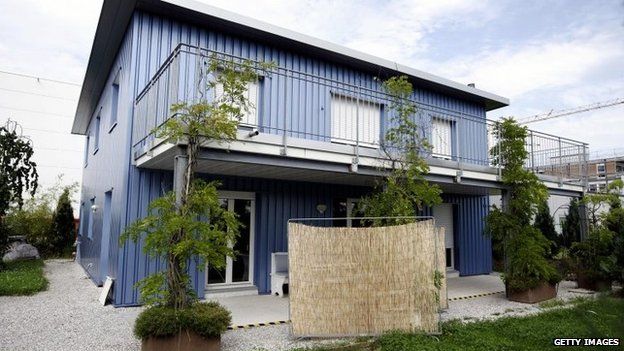St Annes businessman Jeffrey Spector dies at Dignitas
- Published

Dignitas has not commented on the Jeffrey Spector case
A British father-of-three who feared he would be paralysed by an inoperable tumour has died at the Dignitas centre in Switzerland.
Businessman Jeffrey Spector, 54, of St Annes, Lancashire, died on Friday following a six-year illness.
He was surrounded by friends and family at a meal shortly before his death at the clinic, which aids accompanied suicide.
His wife Elaine and three daughters said they respected his decision.
'Overwhelming desire'
The family said in a statement: "Whilst we are now in a state of all-consuming grief and miss Jeffrey very much, we also recognise that he is now at peace and away from the fear which surrounded him in the last few weeks of his life.
"Jeffrey ended his life with dignity and control which was his overwhelming desire."
In an interview with the Blackpool Gazette, external last week, Mr Spector said: "If I am paralysed and can't speak, send me to the spirit world."
He reportedly said the condition was affecting his nervous system.
Friend Linda Earle, who had known him for 20 years, said: "He's fought it every step of the way. I've never known a man try so hard.
"I don't blame him for a minute....it's no one else's decision but his own."
Journalist David Graham told BBC Radio Lancashire he had spoken to Mr Spector at his hotel near the clinic in Zurich.
Friend Linda Earle says it was "no-one else's decision but his own"
Mr Graham said Mr Spector, a director of an advertising agency, had had a series of consultations with leading surgeons across the UK.
"He had one operation which failed and I think that spurred him on the Dignitas route," said Mr Graham.
'Completely wrong'
In England and Wales, the Suicide Act 1961 makes it an offence to encourage or assist a suicide or a suicide attempt.
Former Lord Chancellor Lord Falconer said he would attempt to reintroduce a bill that would allow assisted dying in the UK.
He said it was "completely wrong" that terminally ill people did not have the option to end their life.
"Whatever your take on the subject, it should be debated," Lord Falconer told the BBC.
Last year the Director of Public Prosecutions, Alison Saunders, clarified assisted suicide guidelines, external, making the prosecution of health professionals less likely.
However, in April, disability rights campaigners who said assisted suicide policy was too "liberal" won permission to bring a legal challenge to her policy.
Rob George, president of the Association for Palliative Medicine, said he was concerned about any possible law change.
He said: "This is a dangerous distraction from providing decent health care, and actually it's the dying that we need to look after.
Lindsay, whose mother died at Dignitas last July, says the travel to Switzerland was "traumatic"
"Our job is to look after people as they die... not in order that they die."
However, the daughter of a woman who died at Dignitas last year said she wanted the law to change so that terminally ill people could end their life at home.
Jayne Bramwell's daughter Lindsay said that it would help to "ease the path for everyone involved and make what is a horrendous time a bit easier".
She said it was "enormously distressing" for her mother to have to travel to Switzerland in a wheelchair.
"She just wanted to be at home and have all her family with her..." she said.
In 2008, a paralysed rugby player from Worcester died at Dignitas, external.
Daniel James, 23, had a collapsed spine following an accident during training with Nuneaton Rugby Club. The Director of Public Prosecutions said prosecutions in the case would not be in the public interest.
Dignitas, which said it aided "accompanied suicide", often described as assisted suicide, has not commented specifically on the Jeffrey Spector case.
The charity, founded in 1998, said: "The main work of Dignitas is not assistance in dying but in fact suicide preventive work, above all suicide-attempt-prevention work in a broad sense."
- Published26 May 2015
- Published26 May 2015
- Published21 October 2012